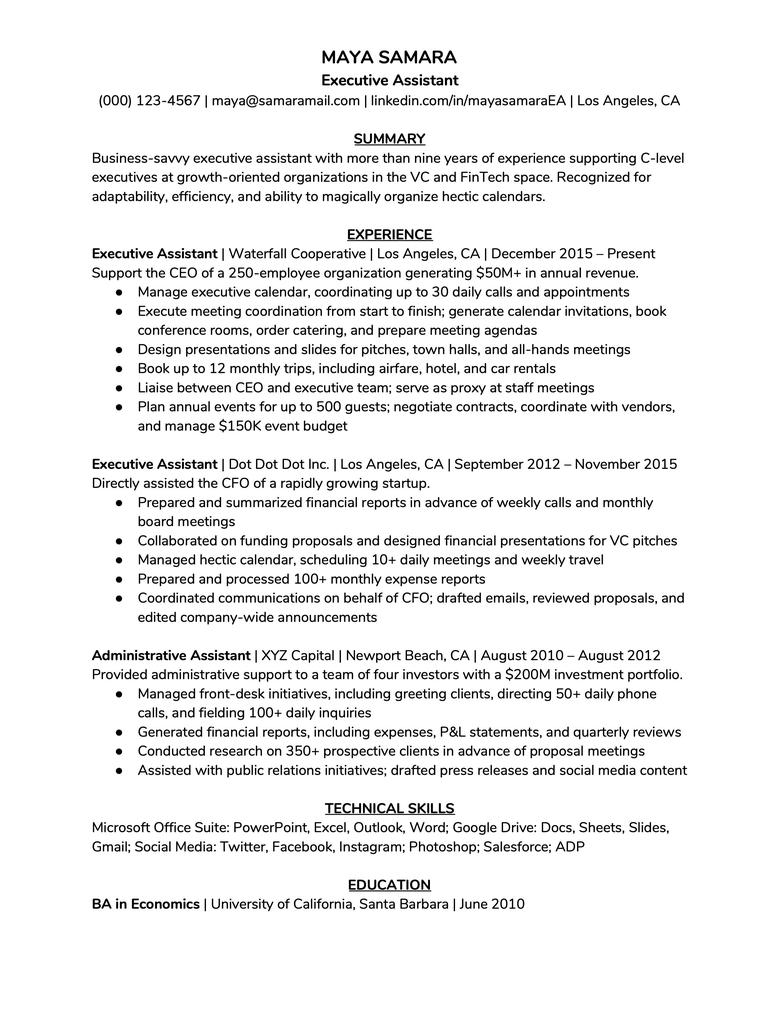
Behind nearly every busy executive is an even busier executive assistant artfully orchestrating their boss’s jam-packed schedule. Executive assistants (or EAs for short) play a key role in keeping an executive’s office running smoothly, often juggling multiple competing priorities all at once. They somehow, as if by magic, keep everything—meetings, schedules, travel arrangements, and much, much more—on track.
But it’s not magic at all. Executive assistants are smart, savvy, and resourceful professionals, with a knack for multitasking and a talent for interacting with people. Drawing on this specialized skill set, they often make what can be a very challenging job look like a breeze. In reality, it’s a fast-paced role that requires organization and adaptability; one moment a quarterly report is your top priority and the next you need to secure a lunch reservation for 12 people ASAP. It takes a special kind of person to be able to perform this job well.
As the title would suggest, executive assistants generally support one or more executives with their administrative needs, like scheduling meetings and booking travel; business operations, like creating presentations and generating reports; or personal needs, like picking up dry cleaning or taking a car into the shop for repairs. Sometimes an executive assistant serves as the gatekeeper between the boss and their team and plans the office holiday party, too. The role varies vastly from one executive to the next, which can be part of the fun—especially if you like being kept on your toes.
As an EA, your resume should spell out the myriad ways that you can make an executive’s life easier, help their days run more smoothly, and increase their overall efficiency. Capturing the breadth of your responsibilities and achievements as an EA on a single page might prove to be a challenge. It’s totally understandable given the array of tasks an EA might perform in a single day, let alone over the span of several years!
The good news is that writing a standout executive assistant resume is easier than you might think. You just need to follow these eight simple tips.
1. Zero in on Your Ideal Role, Company, Industry, and/or Executive
Because an EA’s responsibilities can vary so greatly, it’s important to get a handle on what you want your role to look like before you start writing your resume. So ask yourself: Is there a specific industry you’d like to target? Do you want to support a single executive or would you prefer to work with a small group of leaders? Are you OK with handling personal matters? Being clear about your preferences will help you draft a strong, compelling resume (and narrow down the roles you apply for!).
2. Tailor your Content
In addition to understanding what you’d like your next EA job to look like, you’ll also need to tailor the content of your resume to reflect the job description for which you’re applying. You’ll find a fantastic guide for doing just that here, but a quick and easy way to fine-tune your tailoring skills is to remember this golden rule: If it’s in the job description and you have experience doing it, then it belongs on your resume.
In other words, if a job posting mentions creating meeting agendas and you’ve created countless agendas with expert efficiency, make sure you mention that on your resume. Conversely, if there’s no mention of assisting with personal needs in the job description, you can leave that portion of your experience out—especially if it’s not something you’d be open to or interested in doing in your next role.
3. Work the Keywords
Chances are, your application is going to pass through an applicant tracking system (or ATS) before it reaches the eyes of a human. And if your resume doesn’t have the right keywords, it might not even make it to a recruiter’s inbox. Customizing your resume for every job you apply to—using the skills and experiences emphasized in the job description—will help you hit all the right terms, but it wouldn’t hurt to work in some executive assistant staples in your initial draft, too.
Here are a few to get you started:
- Booking Travel
- Budgeting
- Calendaring
- Confidentiality
- Corporate Communications
- Correspondence
- Discretion
- Editing & Proofreading
- Meeting Coordination
- Microsoft Office Suite
- Preparing Agendas
- Presentations
- Report Generation
- Reviewing Contracts
- Scheduling
4. Keep It Interesting (and Be Specific!)
Most executives will emphatically agree that they wouldn’t be able to function without their assistants. That’s a pretty huge deal. As an EA, you play an integral role in the overall success of a business—and the content of your resume should reflect that.
Using bullet points to illustrate your experience and being as specific as possible will help make your resume much more compelling. So rather than simply stating that you drafted email communications on behalf of the CEO, you might say that you “composed 20+ daily email communications, weekly briefings, and quarterly updates on behalf of the CEO, saving her an average of 10 hours a week.” That sounds much more impressive, doesn’t it?
5. Showcase the Numbers
Speaking of being specific, using numbers will help you illustrate and highlight your career accomplishments, making it more likely you’ll catch a recruiter’s eye.
Think of it this way: A recruiter will think it’s good that you’ve booked travel arrangements, but they’ll think it’s great that you coordinated upward of 10 trips a month, including flights, hotel bookings, car rentals, dinner reservations, and meeting agendas, all while staying within the monthly $14K travel budget.
So whether you’ve increased efficiency by 30%, decreased waste by 77%, managed a complex executive calendar with 20+ daily meetings, or saved the company $26K by switching to a new vendor, make sure you don’t leave those numbers out.
6. Highlight Your Special Skills
Are you a whiz with spreadsheets? Do you have a background in event planning? Have you assisted with negotiating several complex contracts? Spend some time reflecting on your unique areas of expertise, as they’ll likely help you stand out. Because executive assistants often find themselves juggling a diverse array of tasks, highlighting your particular mix of skills—technical or otherwise—can be a great way to demonstrate your resourcefulness.
7. Consider a Summary (Optional!)
I typically reserve resume summaries for entry-level job seekers and career changers, so if you’ve already got a few years of EA experience, you can probably skip this. But if you’d like to take a couple of lines (no more than three) to briefly introduce yourself to a prospective employer, it won’t hurt anything either. Here’s what a great EA summary might look like:
“Resourceful executive assistant with five years of experience supporting C-suite executives in the digital advertising space. A scheduling whiz specializing in booking travel and coordinating meetings. Recognized for tact, creativity, and prioritization.”
8. Remember a Few Tried-and-True Resume Guidelines
There are a handful of sacred resume rules that transcend virtually every industry, specialty, and experience level. So I highly recommend keeping these in mind as you draft your executive assistant resume:
- Keep it to a single page (two at most, and only if your situation warrants it). There are plenty of ways to cut down your resume, including removing experience that’s more than 10 to 15 years old and, going back to number two above, tailoring your resume for each role.
- Follow a chronological format. This common layout works for most job seekers, but if you have a more unconventional work history, are looking to make a career pivot, or don’t have a lot of recent experience, you may want to consider a functional or combination resume instead (just be aware that recruiters and hiring managers tend to eye functional, or skills-based, resumes with caution).
- Create clearly defined sections. This is just one more way to make it super easy for someone to scan your resume and find all of the information they’re looking for.
- Proofread! Then have a friend proofread it for you. Then proofread it yourself again.
What Does an Executive Assistant Resume Look Like?
So what will it look like when you’re finished? That’ll depend greatly on your unique experience and achievements. But here’s an example of a great executive assistant resume for inspiration:

Executive assistants are often the unsung heroes of an organization, literally keeping leadership on task, on schedule, and under budget. Chances are, you’ve achieved some pretty impressive things in your career as an EA (and are excited about continuing to add to your impressive list of accomplishments). Just make your resume reflects that!